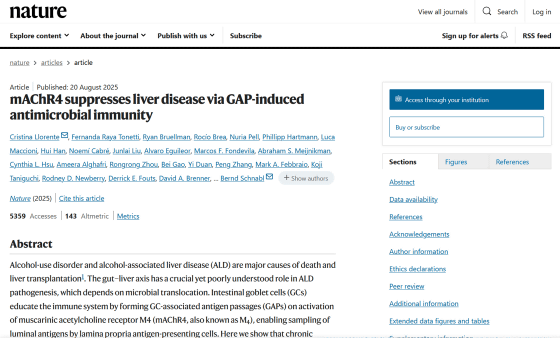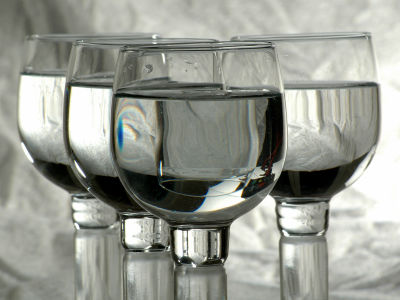Alcohol consumption promotes liver damage by intestinal bacteria, creating a vicious cycle

Alcohol in alcohol has relaxing and uplifting effects, making it a great way to relax, but drinking too much can cause cumulative liver damage. New research has revealed a vicious cycle in which chronic alcohol consumption promotes 'intestinal bacteria attacking the liver.'
mAChR4 suppresses liver disease via GAP-induced antimicrobial immunity | Nature

mAChR4 Boosts Liver Health Through GAP Immunity
https://scienmag.com/machr4-boosts-liver-health-through-gap-immunity/
Vicious Cycle Revealed: How Alcohol Helps Gut Bacteria Attack Your Liver : ScienceAlert
https://www.sciencealert.com/vicious-cycle-revealed-how-alcohol-helps-gut-bacteria-attack-your-liver
Alcohol Opens the Floodgates for Bad Bacteria
https://today.ucsd.edu/story/alcohol-opens-the-floodgates-for-bad-bacteria
Alcohol-related liver disease is a global public health challenge, and it is known that gut bacteria translocate to the liver during chronic alcohol consumption and cause inflammation, but the complex interactions between the gut and liver are only partially understood.

A study led by a team of researchers at the University of California, San Diego, investigated the effects of chronic alcohol consumption in human liver
They found that chronic alcohol consumption inhibits the production of a cell signaling protein called mAChR4 in the small intestine, inhibiting a phenomenon known as goblet cell-associated antigen passages (GAP).
GAP is a process in which goblet cells, mucus-secreting unicellular glands, ingest materials from the gut and deliver them to antigen-presenting cells on the outside. GAP formation is important in inducing the immune system to respond to microorganisms that have migrated from the intestinal tract to areas where they are not naturally present. Without GAP, escaped gut bacteria could more easily invade organs such as the liver, potentially exacerbating alcohol-related damage.
The study also confirmed that the inhibition of mAChR4 production and GAP by alcohol consumption is a bidirectional phenomenon. When the research team restored mAChR4 function, GAP was re-formed, which resulted in a restored immune system response to gut bacteria and reduced inflammatory damage to the liver.

Restoring mAChR4 function can be achieved by using drugs that directly activate mAChR4 or by targeting related pathways that ultimately produce the same effect. Of course, reducing alcohol intake would have the most direct health benefit, but this is not always easy.
mAChR4 may also play an important role not only in the liver attack caused by gut bacteria, but also in alcohol use disorder . Although mAChR4 plays a key role in brain regions that control habit and addiction, it is known that mACHR4 expression levels are low in the brains of patients with alcohol use disorder.
Drugs that increase mAChR4 levels in the brain are already being tested in clinical trials for schizophrenia , and these drugs may eventually be studied as treatments for alcohol use disorder.
Related Posts:
in Free Member, Science, Food, Posted by log1h_ik







